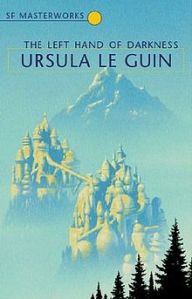 Although a little hard to get into at first, Ursula K. Le Guin’s The Left Hand of Darkness was an enjoyable read. I’m not going to say it was a thrilling read, but it offered something much deeper and more gritty than some sci-fi that I have read. The novel, actually a collection of different documents, is about Genly Ai, an ambassador from the Ekumen coming to Winter, a planet locked in an Ice Age, and attempting to convince them to join up with the rest of humanity. The Gethenians, Winter’s indigenous population, are unique in the galaxy because they are androgynous, taking a sex once a month during their “kemmer”. As you can see, there is a fair bit going on in terms of narrative complexity, hence my initial problems getting into the novel. Once everything becomes a little more clear, like what the Ekumen is, what the politics of Winter are, and what the general customs of the Gethenians are, the novel becomes a much more enjoyable read. In many ways, I feel like I may have missed a fair bit in the novel’s early chapters simply because I was trying to catch up to Le Guin’s complex world. I learned later that this novel is part of the Hainish cycle in Le Guin’s work, so not having read the earlier books might have made in the initial learning curve a little steep.
Although a little hard to get into at first, Ursula K. Le Guin’s The Left Hand of Darkness was an enjoyable read. I’m not going to say it was a thrilling read, but it offered something much deeper and more gritty than some sci-fi that I have read. The novel, actually a collection of different documents, is about Genly Ai, an ambassador from the Ekumen coming to Winter, a planet locked in an Ice Age, and attempting to convince them to join up with the rest of humanity. The Gethenians, Winter’s indigenous population, are unique in the galaxy because they are androgynous, taking a sex once a month during their “kemmer”. As you can see, there is a fair bit going on in terms of narrative complexity, hence my initial problems getting into the novel. Once everything becomes a little more clear, like what the Ekumen is, what the politics of Winter are, and what the general customs of the Gethenians are, the novel becomes a much more enjoyable read. In many ways, I feel like I may have missed a fair bit in the novel’s early chapters simply because I was trying to catch up to Le Guin’s complex world. I learned later that this novel is part of the Hainish cycle in Le Guin’s work, so not having read the earlier books might have made in the initial learning curve a little steep.
Part of the thickness of The Left Hand of Darkness comes from its careful and thorough attention to Gethenian cultures and customs. There are several nations on the planet with Karhide and Orgoreyn the primary settings, yet each has its own unique customs, clan structures and Hearths. The novel reads more like a work of anthropology than a thriller narrative. This was at first a little disappointing as I had been expecting something lighter. I think I might be learning that science fiction is often very heady and idea-heavy rather than plot-driven. However, this density became more compelling the farther I went in the novel so that the myths and folk tales interspersed throughout offered a depth to the narrative.
L, a colleague, complained that Le Guin had this amazing space set up to deal with gender but does not do much with it. I beg to differ as the entire Gethenian people are so alien and strange because of their lack of sexual drive. Their world rarely has wars, has no real sense of inequality, and very different customs relating to sexuality because of the unique biology of the Gethenian body. In the introduction to the edition that I read, Le Guin says that you can treat the novel as a ‘thought-experiment’ (vii) and the androgyny of the Gethenian people is clearly the central thought of this novel. Yet it is also combined with the fact that they live on a very harsh planet which is perpetually winter and resources are not plentiful. Having finished the novel last night, I want to read it again to properly assess L’s claim. Its texture demands the sort of careful attention that I am not sure I gave it. Alas, the reading must go on and this will have to be put aside for another time.
I would recommend this book to readers looking for sci-fi with a deeply philosophical and anthropological bent.
Le Guin, Ursula K. The Left Hand of Darkness. 1969. New York: Harper & Row, 1980. Print.